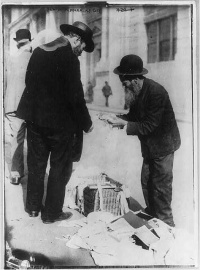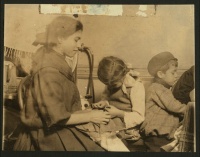From The Peopling of New York City
Contents |
Occupations
During the early years of Jewish immigration, there was very little opportunity for a broad range of employment.
The earliest immigrants became peddlers in hopes of being able to work their way up. Jewish immigrants became peddlers in hopes of being able to earn some capital to be able to one day become pushcart operators or perhaps even open up their own business. Peddling was laborious work but it was preferred by many immigrants because it did not require much skill and it was a way to avoid the garment industry.[1]
Garment Industry
Most Jews, however, were not able to escape the garment industry and had to settle for a job in clothingmanufacturing. This industry was growing rapidly and Jewish immigrants were a major part of its labor force as “six of every ten Jewish workers were engaged in the production of clothing."[2] This high number of participation of Jews was due to a number of reasons. First, some Jewish immigrants already brought some tailoring experience from their homelands. Another reason was the accessibility to the garment shops as 80 percent of the garment factories were located under 14th street, close to the Lower East Side. The fact that most of the garment employers were mostly Jewish also lead to the hiring of Jewish workers. [1]
Over time, Jews were able to move up and become owners of their own business. This was shown by that fact that around 1937, “Jews owned two-thirds of the city’s 34,000 factories and 104,000 wholesale and retail enterprises.” [2]
Moving Up
By the middle of the 20th century, after discrimination in schools and in the workplace was eliminated, Jews were able to pursue professional careers. Jews were able to succeed in the medical, law, and academic field. A number of Jews also succeeded in corporations, banks, law firms, and real estate. Due to more advanced education, towards the end of the 20th century, Jews continued to prosper in “finance, real estate, and educational and cultural institutions.”[2]
References
- ↑ 1.0 1.1 Howe, Irving. World of our fathers. New York: Harcourt Brace Jovanovich, 1976.
- ↑ 2.0 2.1 2.2 Binder, Frederick, and David Reimers. All The Nations Under Heaven. New York: Columbia UP, 1995.
- Return to Occupational Patterns
- Return to Jewish

